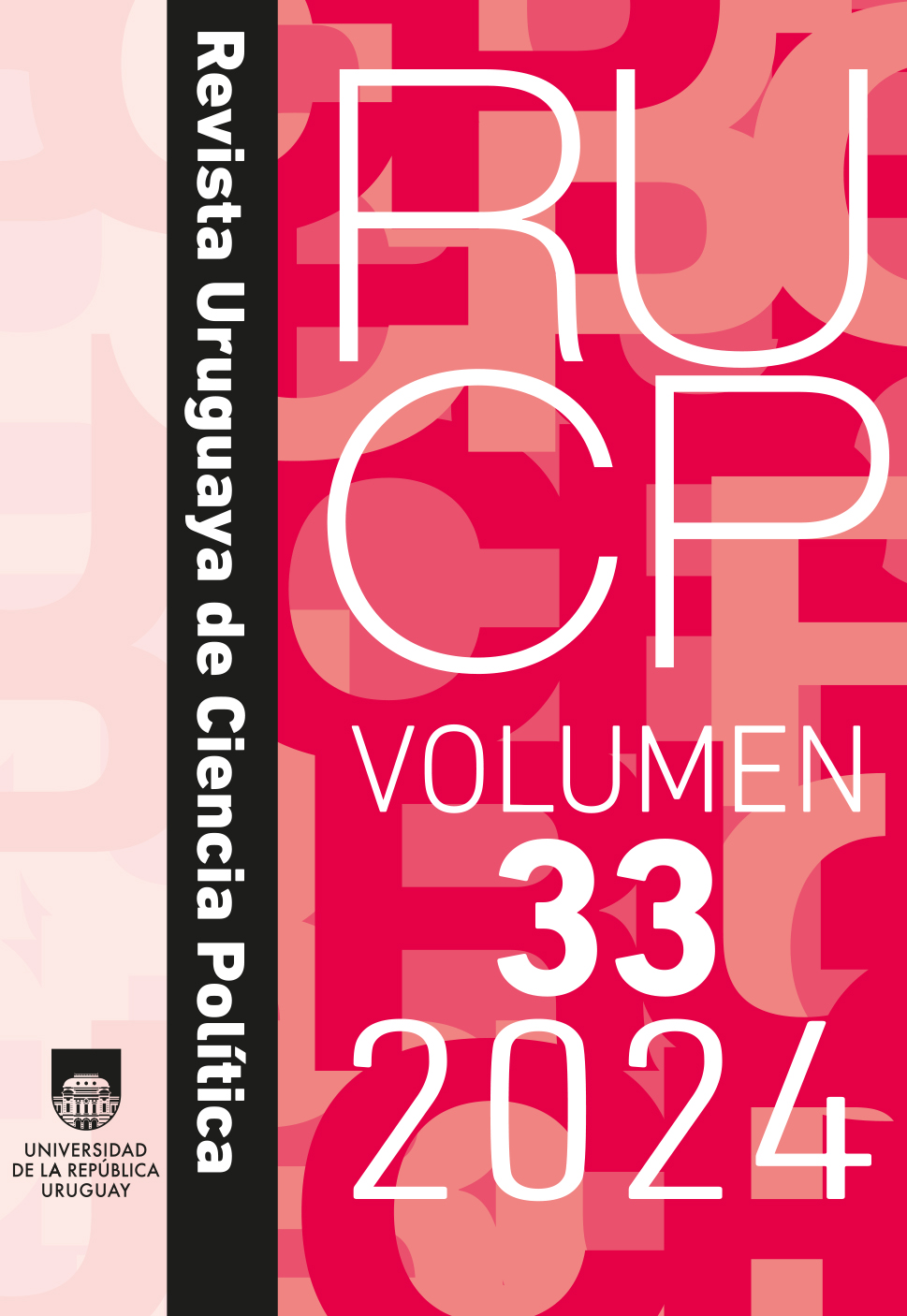Cuando la integridad electoral está en riesgo: democracia, fraude e instituciones en América Latina
DOI:
https://doi.org/10.26851/RUCP.33.10Palabras clave:
democracia, América Latina, fraude electoral, integridad electoralResumen
¿Cómo afectan las características de los Electoral Management Bodies (EMB) al fraude electoral? Este estudio investiga cómo el diseño institucional de los EMB influye en la ocurrencia de fraudes electorales y explora la relación entre diferentes características de los EMB y varios tipos de fraude. La literatura reciente destaca la importancia de la autonomía de los EMB respecto de la administración pública y el diseño institucional eficaz. Utilizando la base de datos del Electoral Integrity Project (EIP), la investigación examina elecciones en países de América Latina. El estudio encuentra que la autonomía y la capacidad institucional de los EMB tienen un impacto significativo en la integridad electoral. Además, la presencia de observadores electorales está vinculada a una reducción del fraude. Al establecer una asociación descriptiva entre la variable independiente (EMB) y la variable dependiente (fraude), e incluir variables relacionadas con la participación de observadores electorales, el estudio identifica patrones en estas relaciones dentro de América Latina. Estos hallazgos sugieren que mejorar la autonomía y la capacidad de los EMB puede mejorar la integridad electoral, ofreciendo información valiosa para las reformas de gestión electoral.
Descargas
Referencias
Achen, C. H., Bartels, L. M. (2016). Democracy for Realists – Why Elections Do Not Produce Responsive Government. Princeton University Press.
Alvim, F. F. (2015). Integridade Eleitoral: significado e critérios de qualificação. Revista Ballot, 1(2), 213-228. doi.org/10.12957/ballot.2015.22134
Anderson, C. J. et al. (2005). Losers’ Consent: Elections and Democratic Legitimacy. Oxford University Press.
Birch, S. (2011). Electoral Malpractice. Oxford University Press.
Birch, S., Van Ham, C. (2017). Getting away with foul play? The importance of formal and informal oversight institutions for electoral integrity.
Cantú, F., Saiegh, S. M. (2011). Fraudulent Democracy? An Analysis of Argentina’s Infamous Decade Using Supervised Machine Learning. Political Analysis, (19), 409-433.
Chaudhary, P., Pokharna, S., Shinde, S., Panjeta, M. (2022). Fake News Detection During 2016 U.S Elections Using Bootstrapped Matedata-Based Naive Bayesian Classifier.
Cheeseman, N. (2018). How to Rig an Election. Yale University Press.
Collier, P., Vincente, P. C. (2012). Violence, Bribery, and Fraud: The political economy of elections in sub-Saharan Africa. Public Choice, 153, 117-147.
Coppedge, M., Gerring, J., Knusten, C. H., Lindberg, S. I., Teorell, J., Alizada, N., Altman, D., Bernhard, M., Cornell, A., Fish, M., Gastaldi, L., Gjerl, H., Glynn, A., Grahn, S., Hicken, A., Hindler, G., Ilchenko, N., Kinzelbach, K., Krusell, J., Marquardt, K., McMann, K., Mechkova, V., Medzihorsky, J., Paxton, P., Pemstein, D., Pernes, J., RydʼEn, O., Von R Mer, J., Seim, B., Sigman, R., Skaaning, S., Staton, J., Sundstrom, A., Tzelgov, E., Wang, Y., Wig, T., Wilson, S., Ziblatt, D. (2022). V-Dem Country-Year Dataset v12. Varieties of Democracy (V-Dem) Project.
Dahl, R. (1975). Polyarchy: Participation and Opposition. Yale University Press.
Donno, D. (2013). Defending Democratic: Norms International Actors and the Politics of Electoral Misconduct. Oxford University Press.
Edgell, A. et al. (2018). When and where do elections matter? A global test of the democratization by elections hypothesis 1900-2010. Democratization.
European Union Election Observation Mission. (2017). Honduras Final Report General Elections.
Garnett, H. A. (2017). Election Management. In A. Nai & P. Norris (Eds.), Election watchdogs: transparency, accountability and integrity. Oxford University Press.
Hartlyn, J., McCoy J., Mustillo, T. M. (2007). Electoral Governance Matter: Explaining the Quality of Elections in Contemporary Latin America.
Hyde, S., Marinov, N. (2012). Which Elections Can Be Lost? Political Analysis, 20(2), 191-210.
James, T., Loeber, L., Garnett, H. A., Van Ham, C. (2016). Improving Electoral Management: The organizational determinants of electoral integrity research proposal. European Conference of Electoral Management.
James, T., Van Ham, C., Garnett, H. A. (2019). Electoral management and the organisational determinants of electoral integrity. International Political Science Review, 40(3), 295-312.
Lehoucq, F. (2003). Electoral Fraud: Causes, Types, and Consequences. Annual Review of Political Science, 6, 233-256. doi.org/10.1146/annurev.polisci.6.121901.085655
Levine, D., Molina, J. E. (2011). The Quality of Democracy in Latin America. The Journal of Politics, 74(1). doi.org/10.1017/S0022381611001290
López-Pintor, R. (2010). Assessing Electoral Fraud in New Democracies: A Basic Conceptual Framework. IFES White Paper, International Foundation for Electoral Systems.
Mainwaring, S., Pérez-Liñán, A. (2003). Level of Development and Democracy: Latin American Exceptionalism, 1945-1996. Comparative Political Studies, 36(9). doi.org/10.1177/0010414003257068
Mozaffar, S., Schedler, A. (2002). The Comparative Study of Electoral Governance: Introduction. International Political Science Review, 23(1), 5-27.
Norris, P., Frank, R. W., Martínez i Coma, F. (2013). Assessing the Quality of Elections. Journal of Democracy, 24(4), 124-135.
Norris, P., Frank, R. W., Martínez i Coma, F. (2015). Why Elections Fail and What We Can Do About It. The Year in Election, 2014. The Electoral Integrity Project.
Norris, P., Grömping, M. (2019). Codebook. The expert survey of Perceptions of Electoral Integrity, Release 7.0, (PEI 7.0). Electoral Integrity Project.
Otaola, M. L. (2017). To include or not to include? Party representation in electoral institutions and confidence in elections: A comparative study of Latin America. Party Politics, 24(51). doi.org/10.1177/1354068816686418.
Poteete, A., Jansson, M., Ostrom, E. (2010). Working Together: Collective Action, the Commons, and Multiple Methods in Practice. Princeton University Press.
Przeworski, A. (2019). Crises of Democracy. Cambridge University Press.
Przeworski, A. et al. (2000). Democracy and Development Political Institutions and Well Being in the World, 1950-1990. Cambridge University Press.
Schedler, A. (2008). ¿Qué es la rendición de cuentas? Cuadernos de transparencia (3).
Shugart, M., Crisp, B. (2000). The Accountability Deficit in Latin America. In S. Mainwaring and C. Welna (Eds.), Democratic Accountability in Latin America (79-131). Oxford Academic. doi.org/10.1093/0199256373.003.0004
Siachiwena, H., Saunders, C. (2021). Elections, legitimacy, and democratic consolidation in Southern Africa. Journal of African Elections, 20(1), 67-114. doi.org/10.20940/JAE/2021/v20i1a4
Vickery, C., Shein, E. (2012). Assessing Electoral Fraud in New Democracies: Refining the Vocabulary. International Foundation for Electoral System.
Zavadskaya, M., Garnett, H. A. (2018). Electoral Integrity and Political Regimes: Actores, Strategies and Consequences. Routledge Taylor & Francis Group.
Descargas
Publicado
Número
Sección
Licencia
Derechos de autor 2024 Revista Uruguaya de Ciencia Política

Esta obra está bajo una licencia internacional Creative Commons Atribución-NoComercial-SinDerivadas 4.0.



























